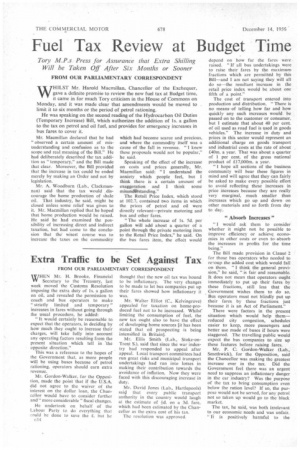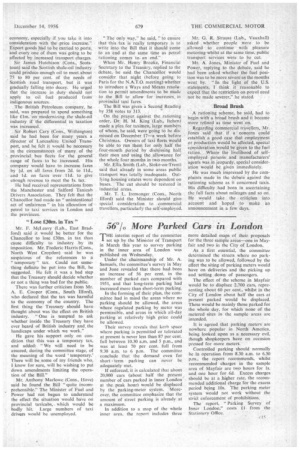Fuel Tax Review at Budget Time
Page 54

Page 55

If you've noticed an error in this article please click here to report it so we can fix it.
Tory M.P.s Press for Assurance that Extra Shilling Will be Taken Off After Six Months or Sooner
FROM OUR PARLIAMENTARY CORRESPONDENT WHILST Mr. Harold Macmillan, Chancellor of the Exchequer, gave a definite promise to review the new fuel tax at Budget time, it came in for much Tory criticism in the House of Commons on Monday, and it was made clear that amendments would be moved to limit it tc• six months or the period of petrol rationing.
He was speaking on the second reading of the Hydrocarbon Oil Duties (Temporary Increase) Bill, which authorizes the addition of Is. a gallon to the tax on petrol and oil fuel, and provides for emergency increases in bus fares to cover it.
Mr. Macmillan declared that he had "observed a certain amount of misunderstanding and confusion as to the scope and real meaning of the Bill." He had deliberately described the tax addition as "temporary," and the Bill made that clear. Moreover, the Bill provided that the increase in tax could he ended merely by making an Order and not by legislation.
Mr. A. Woodburn (Lab., Clackmannan) said that the tax would discourage the home production of shale oil. That industry, he said, might be closed unless some relief was given to it. Mr. Macmillan replied that he hoped that home production would be raised. He said he had examined the possibility of increasing direct and indirect taxation, but had come to the conclusion that the wisest course was to increase the taxes on the commodity
which had become scarce and precious, and where the commodity itself was a cause of the fall in revenue. "I knew these proposals would not be popular," he said.
Speaking of the effect of the increase on costs and prices generally, Mr. Macmillan said: "I understand the anxiety which people feel, but I think there is a certain amount of exaggeration and I think some misunderstanding."
The Retail Price Index, which stood at 102.7, contained two items in which the prices of petrol and oil were directly relevant—private motoring and bus and other fares.
"The whole increase of Is. 5d. per gallon will add about a quarter of a point through the private motoring item to the Retail Price Index," he said. On the bus fares item, the effect would
depend on how far the fares were raised. "If all bus undertakings were to raise their fares by the maximum fractions which are permitted by this Bill—and I am not saying they will all do so—the resultant increase in the retail price index would be about one fifth of a point."
The cost of transport entered into production and distribution. "There is no means of telling how far and how quickly any such increases would be passed on to the customer or consumer, but I estimate that about 40 per cent. of oil used as road fuel is used in goods vehicles." The increase in duty and prices in this sector would represent an additional charge on goods transport and industrial costs at the rate of about £40m. a year. That was about a quarter of 1 per cent. of the gross national product of £17,000m. a year.
"I hope all sections of the business community will bear these figures in mind and will agree that they can fairly be asked to make every possible effort to avoid reflecting these increases in price increases because they are really very marginal, much smaller than increases which go up and down on other materials and so forth from day to day.
"Absorb Increases"
"1 would ask them to consider whether it might not be possible to improve efficiency or achieve economies in other costs or even to absorb the increases in profits for the time being."
The Bill made provision in Clause 2 for those bus operators who needed to recoup the added cost which would fall on them. "I think the general provision," he said, "is fair and reasonable. It does not mean that operators ought immediately to put up their fares by these fractions, still less that the Government wishes them to do so. Bus operators must not blindly put up their fares by these fractions just because it is an Act of Parliament."
There were factors in the present situation which would help them— reduced city congestion, schedules easier to keep, more passengers and better use made of buses if hours were staggered. The travelling public would expect the bus companies to size up these features before raising fares.
Mr. P. C. Gordon-Walker (Lab., Smethwick), for the Opposition, said the Chancellor was making the greatest increase ever in the tax. Did the Government feel there was an urgent need to suppress an inflationary danger in the car industry? Was the purpose of the tax to bring consumption even below the ration level? If so, the purpose would not be served, for any petrol not so taken up would go to the black market.
The tax, he said, was both irrelevant to our economic needs and was unfair. "It is positively harmful to the economy, especially if you take it into consideration with the price increase."
Export goods had to be carried, to ports; and every one of them was going to be affected by increased transport charges.
Sir James Hutchison (Cons., Scotstoun) said the Scottish shale-oil industry could produce enough oil to meet. about 75 to 80 per cent, of the needs of Scottish road transport, but it was gradually falling into decay. He urged that the increase in .duty should not apply to oil fuel produced from indigenous sources.
The British Petroleum company, he said, was prepared to spend something like Lim. on modernizing the shah-oil industry if the differential in taxation was increased..
Sir Robert Cary (Cons., Withington) said he had been for many years a director of Lancashire United Transport, and he felt it would be necessary in the circumstances of many of the provincial bus fleets for the general range of fares to be increased. His company would have to increase fares by ed. on all fares from 2d. to lid., and Id. on fares over lid, to give enough revenue to meet the Is. tax.
He had received representations from the Manchester and Salford Taxicab Drivers Association. They felt that the Chancellor had made an "unintentional act of unfairness" in his allocation of petrol to taxi services in London and the provinces.
"Lose £30m. in Tai" Mr. F. .MeLeavy (Lab., East Bradford) said it would be better for the Chancellor to lose £30m. in tax than cause difficulty to industry by its imposition. Mr. Frederic Harris (Cons., North West Croydon) said he was suspicious of the references to a " temporary " tax. Could not something definite be put into the Bill, he suggested. He felt it was a bad step that the Treasury should decide whether or not a thing was bad for the public.
There was further criticism from Mr, A. E. Cooper (Cons., South Ilford), who declared that the tax was harmful to the economy of the country. The first thing the Treasury should have thought about was the effect on British industry. "One is tempted to. ask whether inside the Treasury they have ever heard of British industry and, the handicaps under which we work."
He gave his support only on condition that this was a temporary tax, and added: "We will need to be assured, during the committee stage, of the meaning of the word 'temporary.' There will be, some of my friends who, I know for sure, will be wishing to put down amendments limiting the operation of the Bill."
Mr. Anthony Marlowe (Cons., Hove) said he found the Bill "quite incomprehensible." The Minister of Fuel and Power had not begun to understand the effect the situation would have on provincial taxicabs,, which would be badly hit. Large numbers of taxi drivers would he unemployed. "The only way." he said, "to ensure that this fax is really temporary is to write into the Bill that it should come to an end at the same time as petrol rationing comes to an end."
When Mr. Henry Brooke, Financial Secretary to the Treasury, replied to the debate, he said the Chancellor would
consiclbr that night (before going to
Paris for the N.A.T.O. meeting) whether to introduce a Ways and Means resolu tion to permit amendments to be made to the Bill to allow for increases in provincial taxi fares.
The Bill was given a Second Reading by 358 votes to 313.
On the prayer against the rationing order, Dr. H. M. King (Lab., ltchen) made a plea for taximen, large numbers of whom, he said, were going to be dismissed on December 17—a week before Christmas. Owners of taxi fleets would be able to run them for only half the four-month period by dismissing half their men and using the allowance for the whole four months in MO months.
Mr. Ellis Smith (Lab., Stoke-on-Trent) said that already in some areas public transport was totally inadequate. Outlying housing estates were dependent on buses. The cut should be restored in industrial areas.
Mr. T. L. Iremonger (Cons., North Ilford) said the Minister should give special consideration to commercial travellers, particularly the self-employed.
Mr. G. R. Strauss (Lab., Vauxhall) asked whether people were to be allowed to continuewith pleasure motoring-whilst at the same time, public transport services were to be cut.
Mr. A. Jones, Minister of Fuel and Power, replying to the debate, said he had been asked whether the fuel position was to be more severe as the months went by. "In the light of the U.S. statements, I think it reasonable to expect that the restriction on petrol need not be made severer," he stated.
Broad Brush
A rationing scheme, he said, had to begin with a broad brush and it became more refined as time went on.
Regarding commercial travellers, Mr. Jones said that if a concern could establish A good case that employment or production would be affected, special consideration would be given to the fuel ration. Where the livelihood of selfemployed persons. and manufacturers' agents was in jeopardy, special consideration would be given immediately.
He was much impressed by the complaints made in the debate against the rationing scheme as it concerned taxis. His difficulty had been in ascertaining the full facts about mileages and so on. He would take the criticism into account and hoped to make an announcement in a few days.
















































































































